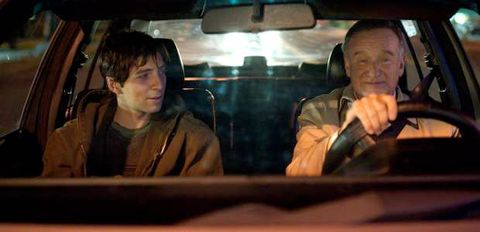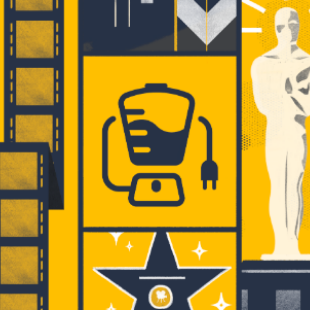Film, entertainment, and the world at large lost a true giant last year when Robin Williams took his own life at the age of 63. As so often happens in these situations, the various projects he was involved in have been trickling out ever since, and we now have his final on-screen performance (he voices a dog later this year in the Simon Pegg and Monty Python-starring Absolutely Anything) in Boulevard.
It’s damn near impossible to watch the fifth film from director Dito Montiel (A Guide to Recognizing Your Saints) and not constantly be sad that this is the last performance we’ll ever see from Williams. While not a bad movie, Boulevard is entirely unremarkable and totally predictable. That isn’t to say it’s without its charms. But it is a relentlessly dour, mopey character study with little to set it apart.
The Oscar-winner plays Nolan Mack, a sad sack of a man living a shell of a life, simply going through his daily motions. He goes to the same mindless job at the same bank branch where he’s gone every morning for the last 26 years; he and his wife, Joy (Kathy Baker), sleep in separate beds, though they have pleasant enough interactions; he has weekly lunches with his best friend, Winston (Bob Odenkirk), a philandering college professor with a penchant for dating younger and younger co-eds; and his father is catatonic in a care facility. Nolan used to have dreams, but now just drifts through life. That all changes when he meets and befriends/falls in love with a young male prostitute, Leo (Roberto Aguire), which causes Nolan to question all of his life choices and finally admit his deepest secret to himself.
With such a singular focus on Nolan, Boulevard necessarily rests on the shoulders of Williams and the script. The star is up to the task, playing a meek workaholic living a lie, trying to find more, saying things like how he likes hotel rooms because they make him feel he’s “somewhere else.”
On the script side of things, however, the story is paint-by-numbers American independent drama. This is the kind of intimate, character-focused picture that fills the ranks of film festivals, and Douglas Soesbe’s script is neither insightful nor incisive enough to ever truly get to the heart of this sad, sad man. Nolan’s relationship with Leo unfolds exactly as every other normal-guy-falling-for-a-hustler tale you’ve ever seen. There are hurt feelings, betrayals, and a confrontation with the least convincing, least frightening pimp you’ve ever encountered.
As the love interest/object of Nolan’s affection, Aguire does little more than shuffle his feet and navel gaze, playing a wounded millennial type. For their parts, Odenkirk and Baker do what they can. Though there is an undercurrent of disappointment and resentment at the life not lived, Winston brings a bit of sardonic humor to Boulevard, which provides welcome momentary reprieves from the heavy sadness. It’s only ever just touched on, but Joy is a woman with her own secrets—you wish this avenue was explored even a little, because it’s more interesting than most of what made it to the screen.
While the first two acts are pedestrian, and one huge bummer after another, by the time Boulevard reaches the third and final act, it finally starts to move with some semblance of purpose. It isn’t enough to save the movie or redeem the maudlin narrative, but this is where you find the strongest moments. There’s one small scene, where Nolan has finally accepted who he is, where we see that Joy knows this, and where he finally realizes that she’s known all along (cryptic, right?). All of this, all of the years of their relationship, is encompassed in a single gesture, where Nolan reaches out to Joy, only to pull back. Right there is where you’re reminded how powerful a performer Williams can be.
The larger messages of it’s never too late to start living life, that you should drive down metaphorical streets you’ve never been down before from time to time, and that nothing turns out like you expect, aren’t bad, but they’re way over-simplified. And though the conclusion is vague, which will frustrate some viewers, it is satisfying enough. Overall, however, Boulevard itself is a mirror of Nolan’s plight: you just can’t help but wish there was more.
Most Popular





